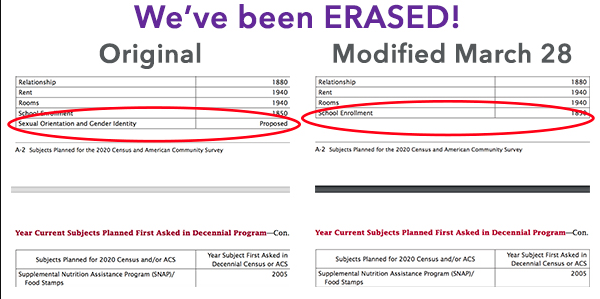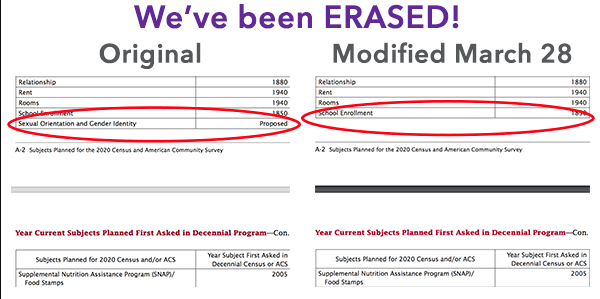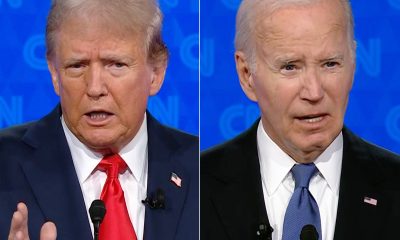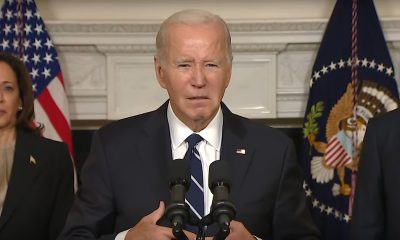National
Trump’s U.S. Census proposes, immediately cuts LGBT survey questions
Agency says proposed LGBT categories ‘inadvertently’ included in report


The U.S. Census proposed, then removed LGBT questions in the U.S. Census and American Community Survey. (Photo courtesy the National LGBTQ Task Force.)
The inclusion of LGBT categories in the Planned Subjects for the 2020 Census Report unveiled on Tuesday must have been music to the ears of LGBT advocates seeking to include sexual orientation and gender identity in federal surveys. But the celebration was short-lived: The U.S. Census on the same day announced those categories were included in error.
Just days before its deadline, the U.S. Census delivered to Congress its report on planned subjects for the survey, including gender, age, race, ethnicity, relationship and homeownership status. Under law, the report is due three years before Census Day, with the next one set to occur April 1, 2020.
“Our goal is a complete and accurate census,” Census Bureau Director John Thompson said in a statement. “In planning for the 2020 Census, the Census Bureau has focused on improving its address list by using imagery, finding ways to increase household self-response, leveraging resources inside and outside the government, and making it easier and more efficient for census takers to complete their work. Furthermore, for the first time ever, the decennial will offer an online response option with the ultimate goal of improving question design and data quality while addressing community concerns.”
The report outlines the importance of including these questions in either the decennial U.S. Census or the newer and more detailed annual American Community Survey, which was established in 1985 and seeks to ascertain socio-economic and housing statistics.
But apparently an initial version of this report went too far. The U.S. Census issued a notice shortly afterward indicating the report was corrected because the initial appendix “inadvertently” included LGBT categories.
“The Subjects Planned for the 2020 Census and American Community Survey report released today inadvertently listed sexual orientation and gender identity as a proposed topic in the appendix,” the statement says. “The report has been corrected.”
The National LGBTQ Task Force has downloaded and published an unredacted copy of the report and posted on its website an image of the initial report and the redacted one that followed.
Neither the U.S. Census, nor the American Community Survey, had ever included questions about sexual orientation or transgender status. However, during the Obama years, other federal surveys included questions seeking to identify responders who are LGBT.
With efforts to streamline the decennial U.S. Census, the addition of LGBT questions would have been unlikely. The inclusion of LGBT categories in the report may indicate those categories were initially planned for the more detailed annual American Community Survey, then taken away.
The Blade has placed a call to the Census Bureau seeking comment on why the LGBT categories were included in the report in the first place and why those categories were removed.
LGBT advocates had been pressing for the inclusion of questions about sexual orientation and gender identity in federal surveys and criticized the Trump administration for proposing to include them in the U.S. Census or American Community Survey, then immediately took them away.
Meghan Maury, criminal and economic justice project director for the National LGBTQ Task Force, said in a statement the cut is the latest step from the Trump administration “to deny LGBTQ people freedom, justice, and equity.”
“LGBTQ people are not counted on the Census — no data is collected on sexual orientation or gender identity,” Maury said. “Information from these surveys helps the government to enforce federal laws like the Violence Against Women Act and the Fair Housing Act and to determine how to allocate resources like housing supports and food stamps. If the government doesn’t know how many LGBTQ people live in a community, how can it do its job to ensure we’re getting fair and adequate access to the rights, protections and services we need?”
According to the Task Force, federal agencies have urged the Census Bureau to collect sexual orientation and gender identity data to aid with implementation of the law. Maury called on Congress “to conduct oversight hearings to reveal why the Administration made the last-minute decision not to collect data on LGBTQ people.”
The redaction of LGBT categories is similar to the proposal at the Department of Health & Human Survey to remove established questions seeking to identify LGBT elders in from the National Survey of Older Americans Act Participants, or NSOAAP. The survey is intended to evaluate the effectiveness of programs funded by the Older Americans Act, such as services for home-delivered meals, homemaker services and the National Family Caregiver Support Program.
Sarah Kate Ellis, CEO of GLAAD, said in a statement the removal of the proposed LGBT questions from the U.S. Census report demonstrates a systematic effort on behalf of the Trump administration to erase LGBT people.
“By erasing LGBTQ Americans from the 2020 U.S. Census, the Trump administration is adding a disgusting entry to a long list of tactics they’ve adopted to legally deny services and legitimacy to hard-working LGBTQ Americans,” Ellis said. “The Trump administration is trying hard to erase the LGBTQ community from the fabric of America, but visibility has always been one of the LGBTQ community’s greatest strengths.”
CORRECTION: An initial version of this article inaccurately reported transgender questions were never included in federal surveys, but at least federal surveys have included gender identity questions. The Blade regrets the error.
U.S. Supreme Court
Concern over marriage equality in US grows two decades after first Mass. same-sex weddings
Gay and lesbian couples began to marry in Bay State in 2004

Two decades after Massachusetts became the first state to legalize same-sex marriage, a new study reveals both significant progress and ongoing challenges for married LGBTQ couples in the U.S., with a growing sense of insecurity about the future of their rights.
The Williams Institute at UCLA School of Law surveyed 484 married same-sex couples from all 50 states and D.C. The study, released Monday, marks the 20th anniversary of legal same-sex marriage in the U.S.
Researchers found that 93 percent of respondents cited love as a primary reason for marrying, with 75 percent also mentioning legal protections. Over 83 percent reported positive changes in their sense of security, and 74.6 percent noted improved life satisfaction since marrying.
However, the study also highlighted persistent discrimination and growing concerns about the future. About 11 percent of couples who had a wedding reported facing prejudice during the planning process.
Alarmingly, nearly 80 percent of respondents expressed concern about the potential overturning of the 2015 Obergefell v. Hodges decision, which legalized same-sex marriage nationwide. This anxiety has been exacerbated by initiatives like Project 2025, a conservative policy blueprint that some fear could roll back LGBTQ rights if implemented.
The possibility of a former President Donald Trump victory in the upcoming election has further intensified these concerns. Many respondents cited Trump’s previous U.S. Supreme Court appointments and his statements on LGBTQ issues as reasons for their apprehension. One participant stated, “The thought of another Trump presidency keeps me up at night. We’ve come so far, but it feels like our rights could be stripped away at any moment.”
The current political climate has 29 percent of respondents considering moving to another state, with 52.9 percent citing socio-political concerns as a primary reason. This reflects a growing sense of insecurity among LGBTQ couples about their rights and freedoms.
Brad Sears, founding executive director of the Williams Institute, noted, “The data clearly show that marriage equality has had a profound positive impact on same-sex couples and their families. However, it also reveals ongoing challenges and serious concerns about the future of these rights in light of current political trends and the upcoming election.”
Christy Mallory, legal director at the Williams Institute and lead author of the study, added, “This research provides crucial insights into the lived experiences of same-sex couples two decades after marriage equality began in the U.S. The high level of concern about potential loss of rights underscores the continued importance of legal protections and public support for LGBTQ+ equality.”
The study found that 30 percent of surveyed couples have children, with 58.1 percent of those parents reporting that marriage provided more stability for their families. However, many of these families now worry about the security of their legal status in the face of potential policy changes and shifting political landscapes.
As the nation reflects on two decades of marriage equality, the study underscores both the transformative power of legal recognition and the ongoing need for vigilance in protecting LGBTQ+ rights. The findings highlight the complex reality faced by same-sex couples in America today: Celebrating hard-won progress while grappling with uncertainty about the future, particularly in light of upcoming political events and potential shifts in leadership.
State Department
State Department hosts meeting on LGBTQ rights and foreign policy
Event took place before Pride Month reception

Secretary of State Antony Blinken on Thursday hosted a group of LGBTQ activists and politicians from around the world at the State Department.
The event — described as a “Convening on U.S. Foreign Policy: National Security, Inclusive Development, and the Human Rights of LGBTQI+ Persons” — took place before the State Department’s annual Pride Month reception. Participants included:
• Jessica Stern, the special U.S. envoy for the promotion of LGBTQ and intersex rights
• U.S. Ambassador to the U.N. Linda Thomas-Greenfield
• U.S. Trade Representative Katherine Tai
• U.S. Ambassador to India Eric Garcetti
• Suzanne Goldberg, senior advisor to the Under Secretary of State for Civil Security, Democracy, and Human Rights
• Under Secretary of State for Civilian Security, Democracy, and Human Rights Uzra Zeya
• U.S. Agency for International Development Senior LGBTQI+ Coordinator Jay Gilliam
• USAID Counselor Clinton D. White
• National Security Council Senior Director for Democracy and Human Rights Kelly Razzouk
• Assistant U.S. Secretary of Health Adm. Rachel Levine
• National Security Council Human Rights Director Jess Huber
• U.N. Assistant Secretary General for Human Rights Ilze Brandt Kehris
• Icelandic Ambassador to the U.S. Bergdís Ellertsdóttir
• Council for Global Equality Co-Executive Director Mark Bromley
• Outright International Senior Advisor for Global Intersex Rights Kimberly Zieselman
• Essy Adhiambo, executive director of the Institute for Equality and Non Discrimination in Kenya
• Pau González, co-chair of Hombres Trans Panamá and PFLAG-Panamá
“Forty-five years ago, thousands gathered in D.C. in what became the first national march for LGBTQI+, demanding their voices be heard,” said Thomas-Greenfield in a post to her X account that showed her speaking at the event. “We must continue to carry forward the spirit of these pioneers and fight for equal rights and dignity for all.”
Forty-five years ago, thousands gathered in DC in what became the first national march for LGBTQI+, demanding their voices be heard.
We must continue to carry forward the spirit of these pioneers and fight for equal rights and dignity for all. 🏳️🌈🏳️⚧️ pic.twitter.com/oph2Ahmfhq
— Ambassador Linda Thomas-Greenfield (@USAmbUN) June 28, 2024
President Joe Biden in 2021 signed a memo that committed the U.S. to promoting LGBTQ and intersex rights abroad as part of his administration’s overall foreign policy.
“LGBTQI+ rights are human rights,” said Blinken. “Our government has a responsibility to defend them, to promote them — here and everywhere.”
Blinken noted consensual same-sex sexual relations remain criminalized in 64 countries, with the death penalty in 11 of them.
He specifically highlighted Uganda’s Anti-Homosexuality Act and Hungarian Prime Minister Viktor Orbán’s government’s “smearing scapegoating, stigmatizing LGBTQI+ persons — vilifying them with degrading labels, denying them equal rights, normalizing violence against them.” (Gay U.S. Ambassador to Hungary David Pressman this month marched in the annual Budapest Pride parade.)
Blinken noted Iraqi MPs earlier this year “passed legislation that punishes same-sex relations with up to 15 years in prison.” He also pointed out that Indonesian lawmakers approved a new criminal code banning extramarital sex.
“In a nation where same-sex couples cannot marry, these laws effectively make all same-sex conduct illegal and they undermine privacy for all Indonesians,” said Blinken.
“We’re defending and promoting LGBTQI+ rights around the world,” he said.
Blinken noted seven countries — Barbados, St. Kitts and Nevis, Antigua and Barbuda, Dominica, Namibia, Singapore, the Cook Islands — have decriminalized consensual same-sex sexual relations over the last two years. He also highlighted Greece, Liechtenstein, and Thailand this year extended marriage rights to same-sex couples, and other countries are banning so-called “conversion therapy.”
“These achievements are possible because of incredibly courageous human rights defenders and government partners on the ground, but I believe America’s support is indispensable,” said Blinken. “When we engage — sometimes publicly, sometimes privately, sometimes both — when we share our own knowledge and experience, we can and we do achieve change.”
Blinken also announced the U.S. now considers sexual orientation and gender identity are part of the International Covenant on Civil and Political Rights that took effect in 1976.
“This is one of the key treaties committing nations to upholding universal rights,” he said.
“In our regular reporting to the council on human rights, we will continue to include incidents of discrimination or abuse committed against LGBTQI+ persons, now with the clear framework of this well-supported interpretation,” added Blinken. “That will further empower our efforts.”
Blinken reiterated this point and the Biden-Harris administration’s commitment to the promotion of LGBTQ and intersex rights abroad when he spoke at the State Department’s Pride Month event.
“Defending, promoting LGBTQI+ rights globally is the right thing to do, but beyond that, it’s the smart and necessary thing to do for our country, for our national security, for our well-being,” he said.
The White House
Jill and Ashley Biden headline White House Pride celebration
First lady celebrated historic pardons of LGBTQ veterans

First lady Jill Biden and the president and first lady’s daughter, Ashley Biden, headlined the White House Pride celebration on the South Lawn on Wednesday, followed by a performance by singer and actress Deborah Cox.
“My dad has built the most pro-equality administration” in history, Ashley Biden said, crediting the work of LGBTQ people of color like Marsha P. Johnson, a prominent figure in the Stonewall uprising of 1969, as well as “so many of you [who] have continued to lead their fearless fighting against against injustice here and around the world.”
She introduced her mother as “the woman who taught me to be myself up showed me in so many ways how I can make a difference” and who “works every single day, tirelessly, to ensure that all people have the opportunities and freedoms that they deserve.”
“I hope that all of you feel that freedom and love on the South Lawn today,” Jill Biden said.
Her remarks were briefly interrupted by a protestor’s chants of “no Pride in genocide,” which was drowned out by chants of “four more years.”
The first lady noted how many of the attendees came “here from states that are passing laws targeting LGBTQ Americans.”
“There are those who see our communities and our families and wish to tear them down,” she said, “those who can’t see that the world is so much bigger and [more] beautiful than they know — but when our homes are threatened, when they strip away our rights, and deny our basic humanity, we say, ‘not on our watch.'”
“Pride is a celebration, but it is also a declaration,” the first lady said, highlighting the U.S. Supreme Court’s ruling in Obergefell v. Hodges nine years ago, which established marriage equality as the law of the land.
She then credited the accomplishments of the Biden-Harris administration on matters of LGBTQ rights, including the repeal of the previous administration’s ban on military service by transgender servicemembers and the FDA’s loosening of restrictions on blood donation by gay and bisexual men.
The first lady also celebrated the president’s announcement earlier on Wednesday that he will pardon LGBTQ veterans who were discharged and court martialed because of their sexual orientation or gender identity.
“We will never stop fighting for this community,” she said.

-

 Canada1 day ago
Canada1 day agoToronto Pride parade cancelled after pro-Palestinian protesters disrupt it
-

 Politics5 days ago
Politics5 days agoLGBTQ issues absent from Trump-Biden debate
-

 Theater4 days ago
Theater4 days agoStephen Mark Lukas makes sublime turn in ‘Funny Girl’
-

 Baltimore3 days ago
Baltimore3 days agoDespite record crowds, Baltimore Pride’s LGBTQ critics say organizers dropped the ball









